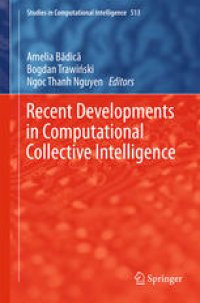
Ebook: Recent Developments in Computational Collective Intelligence
- Tags: Computational Intelligence, Artificial Intelligence (incl. Robotics)
- Series: Studies in Computational Intelligence 513
- Year: 2014
- Publisher: Springer International Publishing
- Edition: 1
- Language: English
- pdf
The book consists of 19 extended and revised chapters based on original works presented during a poster session organized within the 5th International Conference on Computational Collective Intelligence that was held between 11 and 13 of September 2013 in Craiova, Romania. The book is divided into three parts. The first part is titled “Agents and Multi-Agent Systems” and consists of 8 chapters that concentrate on many problems related to agent and multi-agent systems, including: formal models, agent autonomy, emergent properties, agent programming, agent-based simulation and planning. The second part of the book is titled “Intelligent Computational Methods” and consists of 6 chapters. The authors present applications of various intelligent computational methods like neural networks, mathematical optimization and multistage decision processes in areas like cooperation, character recognition, wireless networks, transport, and metal structures. The third part of the book is titled “Language and Knowledge Processing Systems”, and consists of 5 papers devoted to processing methods for knowledge and language information in various applications, including: language identification, corpus comparison, opinion classification, group decision making, and rule bases.
The book consists of 19 extended and revised chapters based on original works presented during a poster session organized within the 5th International Conference on Computational Collective Intelligence that was held between 11 and 13 of September 2013 in Craiova, Romania. The book is divided into three parts. The first part is titled “Agents and Multi-Agent Systems” and consists of 8 chapters that concentrate on many problems related to agent and multi-agent systems, including: formal models, agent autonomy, emergent properties, agent programming, agent-based simulation and planning. The second part of the book is titled “Intelligent Computational Methods” and consists of 6 chapters. The authors present applications of various intelligent computational methods like neural networks, mathematical optimization and multistage decision processes in areas like cooperation, character recognition, wireless networks, transport, and metal structures. The third part of the book is titled “Language and Knowledge Processing Systems”, and consists of 5 papers devoted to processing methods for knowledge and language information in various applications, including: language identification, corpus comparison, opinion classification, group decision making, and rule bases.
The book consists of 19 extended and revised chapters based on original works presented during a poster session organized within the 5th International Conference on Computational Collective Intelligence that was held between 11 and 13 of September 2013 in Craiova, Romania. The book is divided into three parts. The first part is titled “Agents and Multi-Agent Systems” and consists of 8 chapters that concentrate on many problems related to agent and multi-agent systems, including: formal models, agent autonomy, emergent properties, agent programming, agent-based simulation and planning. The second part of the book is titled “Intelligent Computational Methods” and consists of 6 chapters. The authors present applications of various intelligent computational methods like neural networks, mathematical optimization and multistage decision processes in areas like cooperation, character recognition, wireless networks, transport, and metal structures. The third part of the book is titled “Language and Knowledge Processing Systems”, and consists of 5 papers devoted to processing methods for knowledge and language information in various applications, including: language identification, corpus comparison, opinion classification, group decision making, and rule bases.
Content:
Front Matter....Pages 1-7
Front Matter....Pages 1-1
Formal and Computational Model for A. Smith’s Invisible Hand Paradigm....Pages 3-12
An Approach to Norms Assimilation in Normative Multi-agent Systems....Pages 13-23
A Dynamic Measurement of Agent Autonomy in the Layered Adjustable Autonomy Model....Pages 25-35
Emergence of Norms in Multi-agent Societies: An Ultimatum Game Case Study....Pages 37-46
A Fractal Based Generalized Pedagogical Agent Model....Pages 47-57
Partially Centralized Hierarchical Plans Merging....Pages 59-68
An Agent-Based Simulation of Christakis-Fowler Social Model....Pages 69-77
Agents in the Browser – Using Agent Oriented Programming for Client Side Development....Pages 79-90
Front Matter....Pages 91-91
Handwritten Numerical Character Recognition Based on Paraconsistent Artificial Neural Networks....Pages 93-102
Substitution Tasks Method for Co-operation....Pages 103-113
Modular Localization System for Intelligent Transport....Pages 115-124
The Estimation of Accuracy for the Neural Network Approximation in the Case of Sintered Metal Properties....Pages 125-134
Algorithms for Solving Frequency Assignment Problem in Wireless Networks....Pages 135-144
Comparing Smoothing Technique Efficiency in Small Time Series Datasets after a Structural Break in Mean....Pages 145-153
Front Matter....Pages 155-155
Enhancing the Effectiveness of the Spelling Checker Approach for Language Identification....Pages 157-166
Single-Pass Corpus to Corpus Comparison by Sentence Hashing....Pages 167-176
Opinion Classification in Conversational Content Using N-grams....Pages 177-186
Towards a Cloud-Based Group Decision Support System....Pages 187-196
MapReduce-Based Implementation of a Rule System....Pages 197-206
Back Matter....Pages 207-207